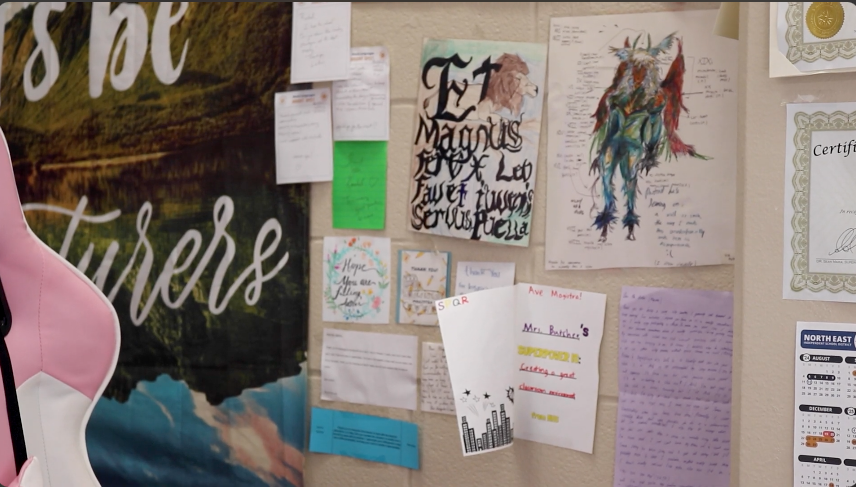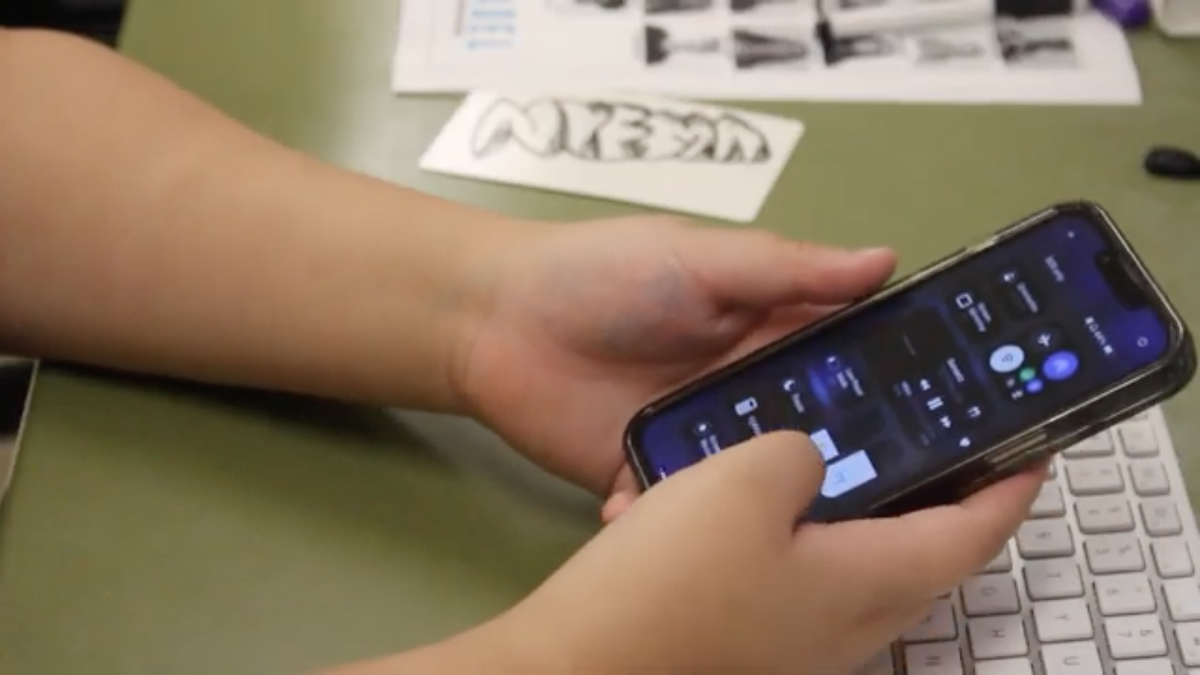by Emma Fischer| feature editor
Senior Bryce Shuster worked on five major holidays; New Years Eve, New Years day, Christmas Day, Christmas Eve and Thanksgiving to accumulate money for his checking account.
“There were bills that needed to be paid. I still needed to buy people Christmas presents. I worked all of Christmas break so maybe the weekend before we come back for school, then I could take a couple of days off and relax,” Shuster said.
Shuster didn’t just work on holidays. He can spend around twenty hours at Northwoods a school week working.
“Typically a week, I can work between four to five days. The typical work shift for me if six to eleven after school. I try to space them out as much as I can. On the weekends I can work the 12 to 9 p.m.s or the 1 to 10:30’s, but on Fridays and Saturdays, they usually close. You’ll get out of there at like one in the morning. Closing in the school weeks can be pretty rough but other than that, I usually work four to five days a week,” Shuster said.
With the many hours of work and pay, Shuster would need a place to keep the money safe. He doesn’t put the cash in his pocket. Instead, he saves and invests.
“I opened a checking account, separate from my savings when I was 16 years old, whenever I started my first job at the AlamoDome,” Shuster said. “I currently work at the movie theatre Northwoods.”
Checking accounts can be opened for a numerous amount of reasons, such as a job requesting a place to directly deposit paychecks.
“The reason I opened a checking account is because at this point, I was having to pay bills separately from my savings account that I needed to draw faster, but when I opened my checking account, I opened a money market account or a CD account which just had better interest than a saving’s account. It really helped me earn better interest over a long period of time,” Shuster said. “For people with less self control, if you open a CD account, then there is a two week period that you cannot withdraw any money.”
There are many students with debit cards, and some with a credit card, but there are many restrictions and requirements to apply for both, and neither are the same.
“Normally, students would wait until they have a need for a checking/savings account before getting one. I believe that students should get a savings account when they are young and that their parents should teach them how to use it,” Turner-Gray said. “It is definitely a good idea to get an account if you are looking for a job. Most jobs now use direct deposit and prefer not to give paper checks.”
Credit cards allow money to be borrowed from a bank to be paid back at the end of the month. A debit card is a direct withdrawal from a checking account, as are checks.
“A credit card allows the user to ‘borrow’ money that they do not have and then pay it back. A debit card removes the money directly from the account, so you are using your money,” Turner-Gray said. “Credit cards are usually only given to people over 18. Someone under 18 can be an authorized user on a parents’ account. In order to get a credit card, you must fill out an application. The company will check your credit history and either approve or deny you. They may also ask for additional information like proof of income.”
Although 18, Shuster doesn’t have a credit card.
“I do not have a credit card. Here’s the thing with the credit card. I want one because of the fact that I want to build a credit by doing stuff like getting gas and paying it off every month but at the same time, I don’t want to accumulate debt at all. The thought is that I can postpone a credit card as long as I can,” Shuster said.
Many students decide to stick to cash, but those who use a card can use its advantage: money management.
“The thing I like about my debit card is that it’s a lot easier to see what I’ve spent my money on and what I didn’t, though apps and stuff. It’s like, ‘hey, you spent $11 at Chick-fil-la on Saturday,’ and I’m like, ‘oh yeah.’ Verses with cash, I have to try to memorize what I spent my money on with receipts. I prefer the debit card. I only write checks if it’s something school related,” Shuster said.
Most people want a credit card for the credit score, but debit cards may be the better route for students with jobs.
“The debit card is instant cash that is pulled out of my account immediately, verses a credit card is an amount balance that eventually I have to pay back. A perk would be not owing any money if I have a credit card. A disadvantage would be that if I lost my debit card is that all the money would be gone. I have never lost a debit card before but the fear is still in me,” Shuster said.
Despite all the perks to a debit card, credit cards have their merits as well.
“Usually, a person would choose to get a credit card to purchase something that is beyond their financial means. For example, a refrigerator. It is not a good idea to use credit unwisely and borrowers should really look at their finances to determine if it is a good idea or not. However, getting a credit card is not always a bad thing if used correctly. A credit card helps you build a good credit history, which is important when the time comes to buy a house or rent an apartment,” Turner-Gray said.
Though, most students aren’t looking to buy an apartment until they are off to college. It’s still possible to have a credit card if the student’s parents’ names are on the card as the primary borrower.
“To apply for a credit card, you must fill out an application. The company will check your credit and determine if you meet their requirements. To have a card tied to a parent’s account, the parent would call their credit card company and request to add an authorized user,” Turner-Gray said. “In addition, the student could apply for a credit card and ask the parent to be a co-signer for the account. That means if the student defaults on the credit card, the parent would be responsible for the payment.”
Maybe students aren’t looking for a debit or credit card to spend money. Some students only have saving accounts for college and extra expenses to save up for.
“[Opening an account] often depends on the bank or credit union. Usually, you will need proof of identity (DL, passport, or birth certificate for example), your social security card, an adult (if you are under 18), and some money to deposit (as little as $5 for most savings accounts),” Turner-Gray said.
Some savings accounts have interest rates, which allows the money in the account to build and grow upon itself.
“The easiest way to check the interest rate would be to go online to the bank or credit unions website. This often changes,” Turner-Gray said.
Although having an individual account allows much for freedom than to be tied to another’s account, sometimes saving is the better choice than to swipe a card and spend.
“Make sure you are saving at least 10% of every paycheck,” Turner-Gray said.
Shuster’s time and money management has made him successful and knowledgeable about the banking system and economic actions of the world beyond Johnson.
“Figure out how much money you have to spend. For me, gas or insurance, no matter what, I will have to spend a certain amount every two weeks. Figure out what your financial situation will be for the month. If you can figure out how much that you are able to spend after all the essential payments, after you put money into your savings, then you can use that extra money. If you got laid off, got fired or if your car broke down, then you can still support yourself and not have to be worried for the next month,” Shuster said. “It’s really all about time management.”
Although the extra 50 cents at the unwanted job may seem to be working an extra hour of despise, Shuster believes otherwise.
“In high school, get a job you enjoy working. If you get a job that you enjoy that is $9 an hour, instead of that $9.50 an hour, then don’t worry about that 50 cents. It’s not worth it,” Shuster said.








